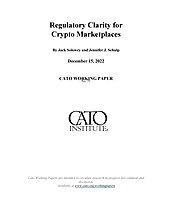Marketplaces for buying, selling, and trading crypto tokens serve a diverse range of users, from sophisticated cypherpunks to casual retail customers. Some marketplaces provide intuitive onramps to the crypto ecosystem, allowing users to purchase cryptocurrencies with fiat money. Others provide technical infrastructure for decentralized finance, or “DeFi,” enabling permissionless, disintermediated global transactions.
Like crypto tokens, the marketplaces on which they trade can be either centralized projects reliant on intermediaries (centralized exchanges, or “CEXs”), or decentralized protocols composed of code (decentralized exchanges, or “DEXs”). Tokens themselves can be centralized, exhibiting the characteristics of securities, or decentralized, functioning as commodities. The crypto ecosystem thus can be thought of as a two-by-two matrix consisting of both CEXs and DEXs for trading both crypto securities and crypto commodities (see Figure 1).

This briefing paper proposes crypto marketplace regulatory policy that is sensitive to these distinctions. It calls for Congress to narrowly tailor rules to relevant risks by clearly defining what it means to be a decentralized exchange; providing centralized crypto token exchanges with a practical path to register with their respective regulators (e.g., the Securities and Exchange Commission (SEC) or the Commodity Futures Trading Commission (CFTC)); and making such registration by decentralized crypto token exchanges strictly voluntary. These proposals support informed consumer choice among different types of marketplaces based on individuals’ own needs, not legacy regulations that disserve the users, developers, and dynamism of decentralized marketplaces.


